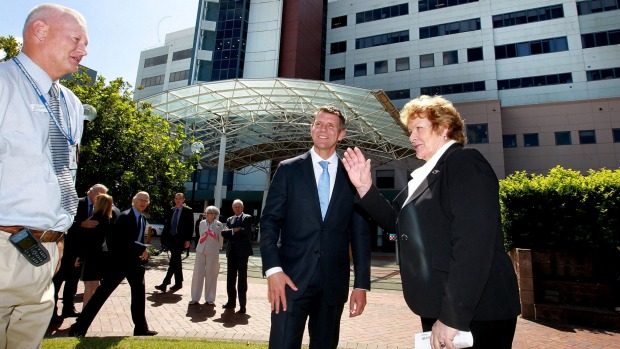
Premier Mike Baird and Health Minister Jillian Skinner outside Prince of Wales Hospital on Monday. Photo: Ben Rushton
Thousands more doctors, nurses and other frontline medical staff will be hired and more elective surgeries performed under a Liberal Party election promise announced on Tuesday.
Premier Mike Baird said if his government was re-elected it would hire another 700 doctors and 2100 nurses over the next four years as well as providing funding to train doctors in rural areas – a policy doctors say will help improve access to care for people living outside the major cities.

Premier Mike Baird and Health Minister Jillian Skinner in Randwick on Monday. Mr Baird said the government had already boosted the health workforce to “record levels”. Photo: Ben Rushton
The NSW arm of the Australian Medical Association has called the policy a “significant step forward” in improving care in the state.
Mr Baird said the government had already boosted the health workforce to “record levels” and it would continue to do so.
“The best way to put patients first is to employ and retain first-rate staff,” he said.
The policy also boosts the number of elective surgeries performed in the state, adding 13500 extra surgeries over four years and continuing to “spot-purchase” operations from the private sector if waiting lists get too long.
Last year, Bureau of Health Information data shows nearly 217,000 elective surgeries were performed in NSW, meaning the announcement represents a 6 per cent increase.
The government also said it will also fund an extra 320,000 emergency department presentations over four years.
However, Australian Medical Association NSW head Saxon Smith said emergency department visits had increase by more than that amount over the past four years, so he was not sure if the increase would meet demand.
“Elective surgery is the first thing that gets cancelled when you have to deal with increasing emergency presentations,” he said. “But with the increased infrastructure, I think they will be able to deliver.
“Overall, the announcement is a significant step forward.”
Dr Smith said $1.2 million that will be spent on 60 rural-based medical trainees – who will also have access to training in the major city hospitals, and $6 million for specialist training positions that focused on rural areas, had been an AMA priority.
“Giving medical trainees the option of training in rural and regional areas is one of the best ways of increasing doctor numbers outside of large cities,” he said.
The government’s workforce announcement also targets a number of other areas of need, with tens of millions for new nurse and midwife educators and practitioners, and 68 training positions in areas such as diagnostic imaging and prosthetics. It also includes funding to train 96 Aboriginal dental assistants.
All together, at least 3500 full-time equivalent frontline staff would be hired, Health Minister Jillian Skinner said, and this would ensure the government met increasing demands on hospitals.
“We will employ more nurses and more doctors, we will fund more surgeries, more emergency department attendances and more hospital admissions – in short, we will keep delivering the best care for our patients,” she said
